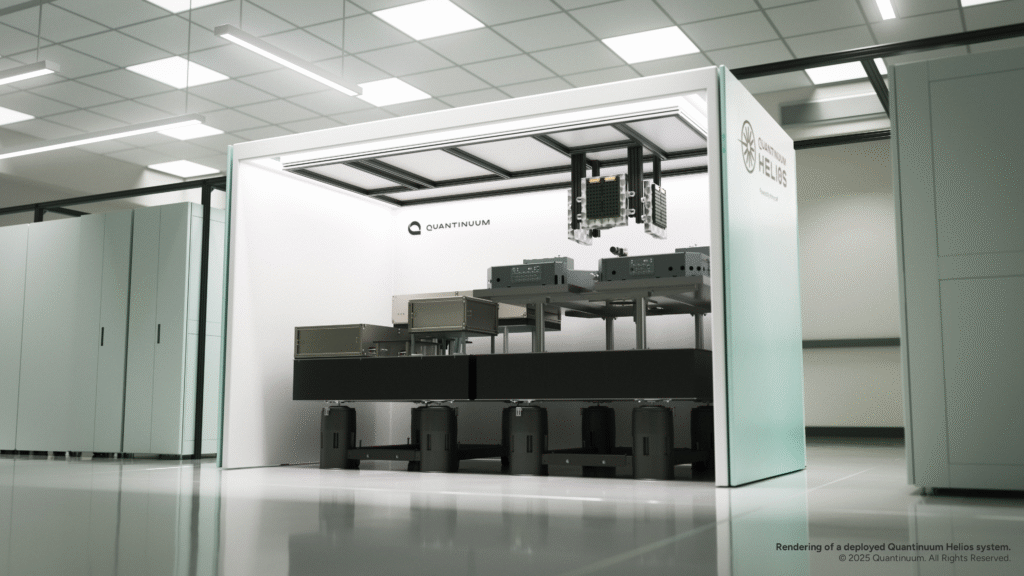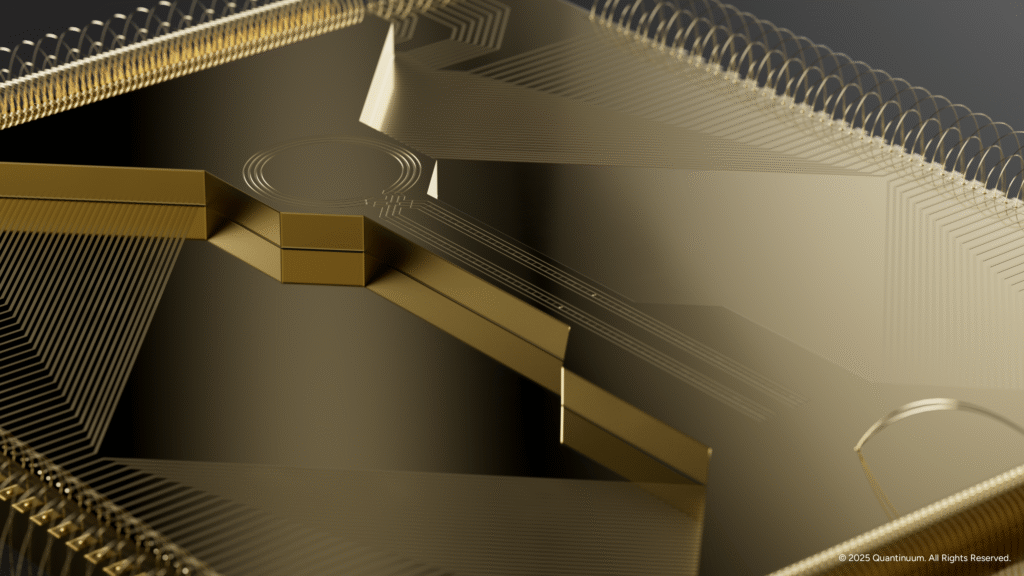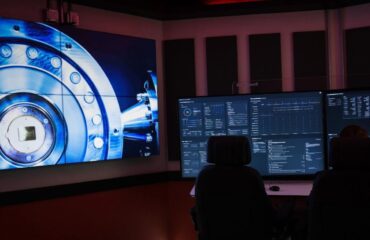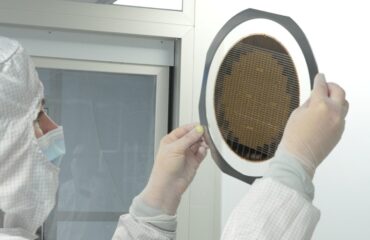
Quantinuum’s control room, displaying on the screen at the left an image of the quantum computer chamber where ions are trapped and made to operate as qubits. Image: Quantinuum.
By James Myers
With little more than four years before the end of the decade, quantum computing companies are racing to be the first to bring a fully functioning quantum computer to market and make 2030 the beginning of a global computing revolution. Among the major names in the rapidly developing industry, which include IBM, Google, IonQ, Microsoft, D-Wave, Rigetti, and Xanadu, US/UK-based Quantinuum has recently unveiled several innovations that could position it at the front of the pack in the final heat of the race.
At the end of October, Quantinuum announced an unexpected discovery that will significantly expand its ability to detect and eliminate errors in circuits and propel the development of a quantum computer free from limitations of the problem known as circuit “decoherence.” Reliable quantum error detection (QED) and elimination is the major barrier now standing in the way of full-scale quantum computing, which promises speed and accuracy far ahead of today’s most powerful supercomputers.
The quantum, which is the smallest unit of energy in the universe that can be either the cause or effect of a physical change, is the basis for information in the quantum computer. Prototypes demonstrate the technology’s incredible potential for blazingly fast and accurate calculations, but the machines are plagued by fragile quantum circuits that are prone to decoherence errors caused by disruptions from heat, electromagnetism, and other environmental factors.
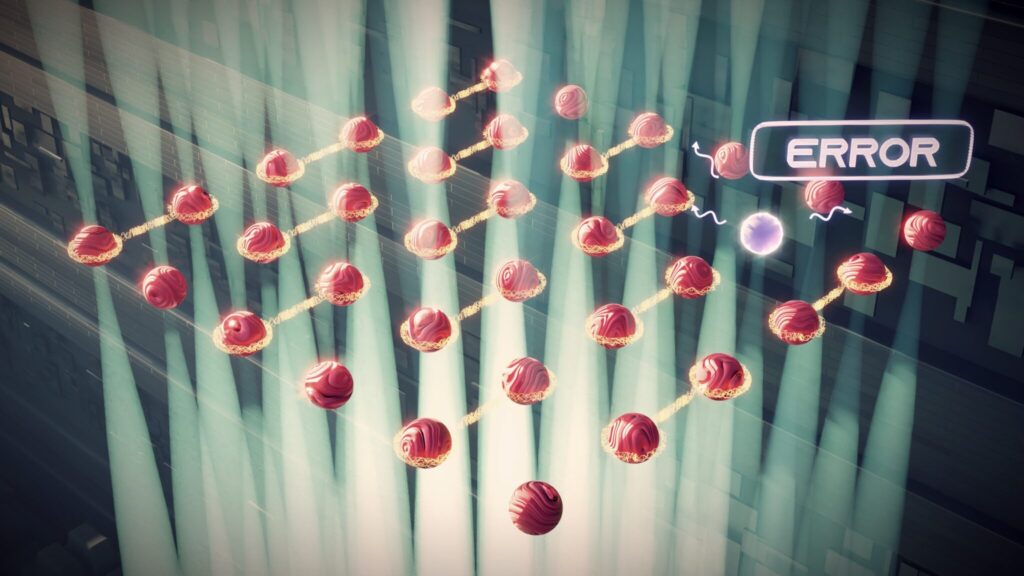
Illustration of quantum decoherence. Image by Gabrielle Meilikhov/Muza Productions, published by Princeton University.
Quantinuum’s researchers found a way of using decoherence errors to trigger the random resetting of circuits and avoid the loss of time that would otherwise be required to locate and fix the errors after they occur. The resets allowed the Quantinuum team to design a protocol that makes quantum circuits adaptive to decoherence events instead of breaking.
With the quantum error detection discovery and new protocol for resilient circuits, Quantinuum states that its H2 quantum processor can run programs on 56 qubits “flawlessly 100x more often than other architectures.” A qubit is a quantum information bit, analogous to the bits that process information in conventional computers.
Error detection and circuit resetting advance the scalability of quantum computing.
The company explains that, “Ultimately, this new protocol will allow QED codes to be used in a scalable way, saving considerable computational resources compared to full quantum error correction (QEC). Researchers at the crossroads of quantum information, quantum simulation, and many-body physics will take interest in this protocol and use it as a springboard for inventing new use cases for QED.”
The unplanned path to the new QED protocol began while the company’s scientists were studying the quantum contact process. The quantum contact process is a variation of familiar everyday contact processes, such as the way diseases spread when people are in close range or water makes its way through a porous material like a sponge. Contact processes can involve phase transitions, like what occurs when water changes phases from liquid to gas as it boils and vaporizes.
The quantum contact process involves a phase transition at the point when the organization of quantum particles changes, characteristically from an ordered state to a disordered state, during fluctuations in the quantum system’s average state. The quantum phase transition occurs when quantum energy is absorbed in the contact process, and studying the quantum contact process that involves the phase transition led to “a surprising result,” as Quantinuum senior advanced physicist Eli Chertkov described the QED discovery.
The industrial scalability of quantum computing has also advanced with the latest generation of high processing accuracy.
Quantinuum has also advanced quantum computing scalability with the development of Helios, which the company calls “the world’s most accurate quantum computer.”
According to Quantinuum, Helios is engineered with the highest fidelity logical qubits and software that features Guppy, a Python-based programming language that allows users to combine classical and quantum computations. Helios is now available to customers through the company’s cloud computing platform.
Helios provides 98 “fully connected” qubits, 50 logical qubits, and fidelity (which is the measure of its accuracy) of up to 99.9975%.
The Quantum Insider describes a logical qubit as a combination of “several physical qubits in a way that spreads out the quantum information, so if one or more physical qubits experience an error, the overall logical qubit can detect and correct it. This ‘team effort’ ensures the computation stays on track, even in the presence of unavoidable errors.” The Quantum Insider reports that a significant increase in the number of patents referring to logical qubits, rising from 150 in 2022 to more than 250 in 2024, is a sign of their increasingly important role in quantum computation.
Clients include JPMorgan Chase, which is using Helios to enhance financial analysis, BMW Group for researching potential materials for fuel cells to advance sustainable mobility, and Softbank for exploring the properties of organic materials for increased efficiency in batteries, optical switches, and solar cells. Biopharmaceutical company Amgen, which is a Quantinuum investor and research partner, is using Helios to explore a hybrid of quantum machine learning for drug discoveries.
Under a new strategic partnership agreement, Quantinuum plans to install Helios in Singapore by the end of 2026 for use by the country’s National Computing Office and National Quantum Computing Hub in developing commercial applications for quantum computing in computational biology and bioinformatics, financial modelling and optimization, advanced materials, and chemistry.
The quantum computing revolution is closer than ever.
The potential for quantum computers is clear, if their circuits don’t decohere. While information bits in conventional computers can exist in only one of two potential states at any time—either 1 (“on”) or 0 (“off”), a qubit is in both 1 and 0 states at the same time because of the curious properties of quantum mechanics. This gives quantum computers the capacity to compute an entire range of probabilities between both states without spending time to switch from one to the other.
What’s the probability that an error-free, fully functioning quantum computer will be commercially available within four years, by 2030?
The rapid pace of discovery and development by Quantinuum and other quantum computing companies is advancing the milestone ever closer. It’s even possible that the revolutionary speed and accuracy of the quantum computer will be at hand sooner than 2030.
Human history with computing and its transformative applications like the internet, which was famously underestimated by industry leaders in the early 1990s, points to the probability that the quantum computing revolution will be upon us sooner than expected.
Craving more information? Check out these recommended TQR articles:
- Thinking in the Age of Machines: Global IQ Decline and the Rise of AI-Assisted Thinking
- Everything Has a Beginning and End, Right? Physicist Says No, With Profound Consequences for Measuring Quantum Interactions
- Cleaning the Mirror: Increasing Concerns Over Data Quality, Distortion, and Decision-Making
- Not a Straight Line: What Ancient DNA Is Teaching Us About Migration, Contact, and Being Human
- Digital Sovereignty: Cutting Dependence on Dominant Tech Companies

